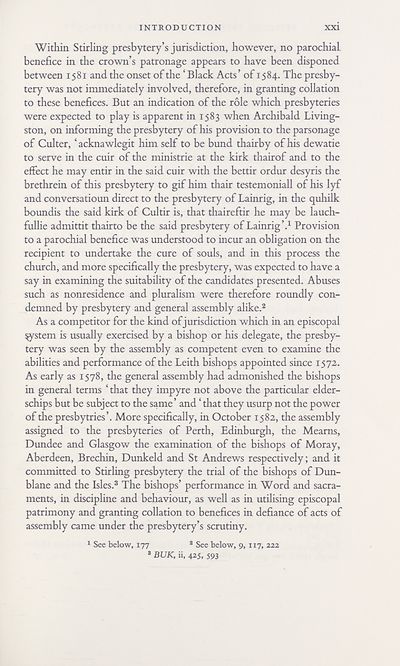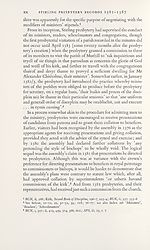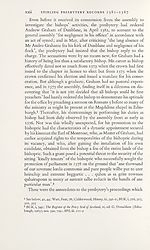Series 4 > Stirling Presbytery Records 1581-1587
(26) Page xxi
Download files
Complete book:
Individual page:
Thumbnail gallery: Grid view | List view

INTRODUCTION
XXI
Within Stirling presbytery’s jurisdiction, however, no parochial
benefice in the crown’s patronage appears to have been disponed
between 1581 and the onset of the ‘Black Acts’ of 1584. The presby¬
tery was not immediately involved, therefore, in granting collation
to these benefices. But an indication of the role which presbyteries
were expected to play is apparent in 1583 when Archibald Living¬
ston, on informing the presbytery of his provision to the parsonage
of Culter, ‘ ackna wlegit him self to be bund thairby of his dewatie
to serve in the cuir of the ministrie at the kirk thairof and to the
effect he may entir in the said cuir with the bettir ordur desyris the
brethrein of this presbytery to gif him thair testemoniall of his lyf
and conversatioun direct to the presbytery of Lainrig, in the quhilk
boundis the said kirk of Cultir is, that thaireftir he may be lauch-
fullie admittit thairto be the said presbytery of Lainrig’.1 Provision
to a parochial benefice was understood to incur an obligation on the
recipient to undertake the cure of souls, and in this process the
church, and more specifically the presbytery, was expected to have a
say in examining the suitability of the candidates presented. Abuses
such as nonresidence and pluralism were therefore roundly con¬
demned by presbytery and general assembly alike.2
As a competitor for the kind of jurisdiction which in an episcopal
system is usually exercised by a bishop or his delegate, the presby¬
tery was seen by the assembly as competent even to examine the
abilities and performance of the Leith bishops appointed since 1572.
As early as 1578, the general assembly had admonished the bishops
in general terms ‘ that they impyre not above the particular elder-
schips but be subject to the same’ and ‘ that they usurp not the power
of the presbytries’. More specifically, in October 1582, the assembly
assigned to the presbyteries of Perth, Edinburgh, the Mearns,
Dundee and Glasgow the examination of the bishops of Moray,
Aberdeen, Brechin, Dunkeld and St Andrews respectively; and it
committed to Stirling presbytery the trial of the bishops of Dun¬
blane and the Isles.3 The bishops’ performance in Word and sacra¬
ments, in discipline and behaviour, as well as in utilising episcopal
patrimony and granting collation to benefices in defiance of acts of
assembly came under the presbytery’s scrutiny.
1 See below, 177 2 See below, 9, 117, 222
* BUK, ii, 425, J93
XXI
Within Stirling presbytery’s jurisdiction, however, no parochial
benefice in the crown’s patronage appears to have been disponed
between 1581 and the onset of the ‘Black Acts’ of 1584. The presby¬
tery was not immediately involved, therefore, in granting collation
to these benefices. But an indication of the role which presbyteries
were expected to play is apparent in 1583 when Archibald Living¬
ston, on informing the presbytery of his provision to the parsonage
of Culter, ‘ ackna wlegit him self to be bund thairby of his dewatie
to serve in the cuir of the ministrie at the kirk thairof and to the
effect he may entir in the said cuir with the bettir ordur desyris the
brethrein of this presbytery to gif him thair testemoniall of his lyf
and conversatioun direct to the presbytery of Lainrig, in the quhilk
boundis the said kirk of Cultir is, that thaireftir he may be lauch-
fullie admittit thairto be the said presbytery of Lainrig’.1 Provision
to a parochial benefice was understood to incur an obligation on the
recipient to undertake the cure of souls, and in this process the
church, and more specifically the presbytery, was expected to have a
say in examining the suitability of the candidates presented. Abuses
such as nonresidence and pluralism were therefore roundly con¬
demned by presbytery and general assembly alike.2
As a competitor for the kind of jurisdiction which in an episcopal
system is usually exercised by a bishop or his delegate, the presby¬
tery was seen by the assembly as competent even to examine the
abilities and performance of the Leith bishops appointed since 1572.
As early as 1578, the general assembly had admonished the bishops
in general terms ‘ that they impyre not above the particular elder-
schips but be subject to the same’ and ‘ that they usurp not the power
of the presbytries’. More specifically, in October 1582, the assembly
assigned to the presbyteries of Perth, Edinburgh, the Mearns,
Dundee and Glasgow the examination of the bishops of Moray,
Aberdeen, Brechin, Dunkeld and St Andrews respectively; and it
committed to Stirling presbytery the trial of the bishops of Dun¬
blane and the Isles.3 The bishops’ performance in Word and sacra¬
ments, in discipline and behaviour, as well as in utilising episcopal
patrimony and granting collation to benefices in defiance of acts of
assembly came under the presbytery’s scrutiny.
1 See below, 177 2 See below, 9, 117, 222
* BUK, ii, 425, J93
Set display mode to:
![]() Universal Viewer |
Universal Viewer | ![]() Mirador |
Large image | Transcription
Mirador |
Large image | Transcription
Images and transcriptions on this page, including medium image downloads, may be used under the Creative Commons Attribution 4.0 International Licence unless otherwise stated. ![]()
| Scottish History Society volumes > Series 4 > Stirling Presbytery Records 1581-1587 > (26) Page xxi |
|---|
| Permanent URL | https://digital.nls.uk/126646467 |
|---|
| Description | Over 180 volumes, published by the Scottish History Society, containing original sources on Scotland's history and people. With a wide range of subjects, the books collectively cover all periods from the 12th to 20th centuries, and reflect changing trends in Scottish history. Sources are accompanied by scholarly interpretation, references and bibliographies. Volumes are usually published annually, and more digitised volumes will be added as they become available. |
|---|


